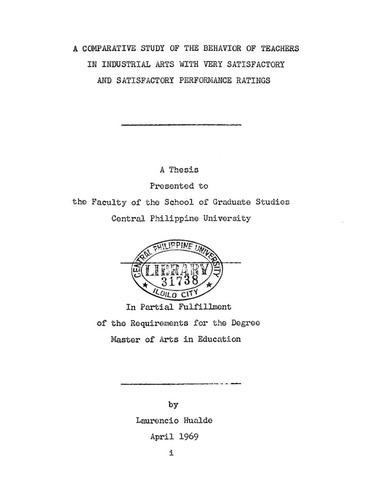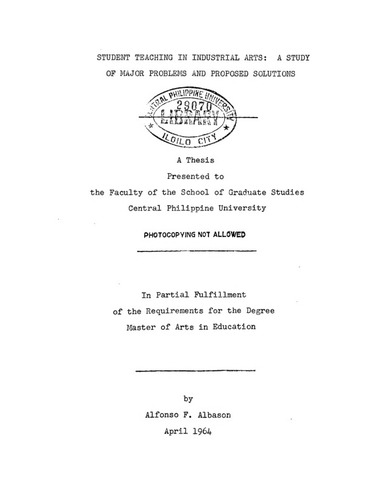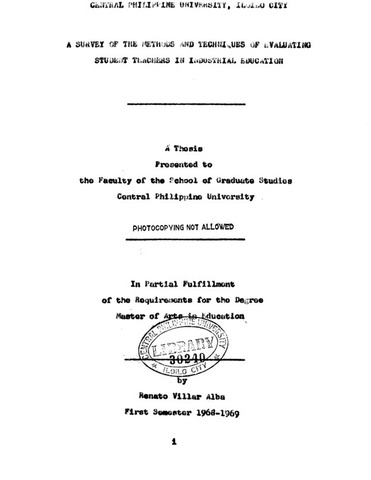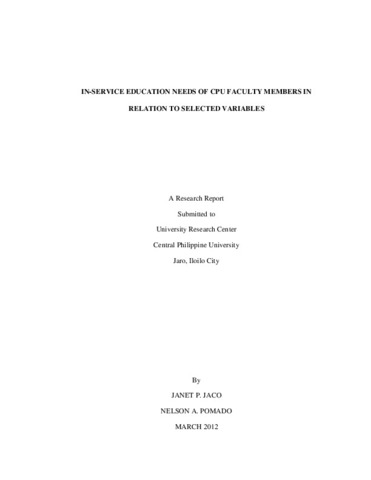A comparative study of the behavior of teachers in industrial arts with very satisfactory and satisfactory performance ratings

Page views
827Date
1969Author
Thesis Adviser
Defense Panel Chair
Share
Metadata
Show full item record
Abstract
The purpose of this study was to investigate the teaching behaviors of the good and the poor teachers in industrial arts. The teachers with the highest performance ratings from thirty to thirty-five points were considered good teachers and those with the lowest ratings from twenty to twenty-five points were considered poor teachers.
Out of eighty behavioral statements, fifty were considered very important by the experts in industrial arts.
These statements were listed in a form of a questionnaire. The questionnaire was divided into five groups; namely, motivation, actual teaching contact, evaluation, remedial work, and attitude. The copies of the questionnaire were sent to the administrators of the industrial arts teachers.
An analysis was made by finding the weighted score for each item, the average weighted score and the mean difference of each factor, the means, the standard deviations, and finally the t-ratio. The two-tailed test was used.
The following are the significant findings:
1. The t-ratio for anchor item 1.0 motivation is 2.37 which is far beyond 1.98 at 5 per cent level.
2. The t-ratio for anchor item 2.0 actual teaching contact is 3 .65 which is far beyond 1.98 at 5 per cent level.
3. As to evaluation, the t-ratio for anchor item 3.0 is .077 which is far below 1.98 at 5 per cent level.
4. As to remedial work, the t-ratio for anchor item 4.0 is 1.675 which is far below 1.98 at 5 per cent level. 5. The t-ratios for anchor items 5.0 and 6.0, attitude towards pupils and attitude towards the profession are 3.78 and 2.35 respectively which are far beyond 1.98 at 5 per cent level.
The conclusions are the following:
1. As to motivation, actual teaching contact, and attitude, the researcher rejects the null hypothesis and concludes that the poor teachers do not seem to perform as effectively as the good teachers.
2. In terms of evaluation and remedial work, the researcher accepts the null hypothesis and concludes that the poor teachers seem to perform as effectively as the good teachers.
The researcher suggests the following recommendations:
1. Both the administrators and the teachers should plan for a yearly evaluation of the teaching behaviors of the industrial arts teachers so that those areas in which the poor teachers perform ineffectively may be improved and/or corrected cooperatively.
2. School administrators must constantly check their teachers' activities in line with the objectives of the industrial arts program.
3. Supervisors and teachers might use the suggested behavioral factors in this study as a frame of reference in the improvement of their work.
4. School administrators and teachers should plan a functional program for in-service development of personnel.
5. The following are also suggested for further investigation:
a. A similar study on the behavior of good and poor teachers of industrial arts in the secondary schools.
b. A study on the attitude of industrial arts supervisors and administrators toward the teaching of industrial arts.
Description
Abstract only
Suggested Citation
Hualde, L. (1969). A comparative study of the behavior of teachers in industrial arts with very satisfactory and satisfactory performance ratings (Unpublished Master’s thesis). Central Philippine University, Jaro, Iloilo City.
Type
ThesisSubject(s)
Industrial arts  ; Industrial arts--Study and teaching (Secondary)
; Industrial arts--Study and teaching (Secondary)  ; High school teachers
; High school teachers  ; High school teachers--Attitudes
; High school teachers--Attitudes  ; Industrial arts teachers
; Industrial arts teachers  ; Industrial arts teachers--Attitudes
; Industrial arts teachers--Attitudes  ; Teachers--Rating of
; Teachers--Rating of  ; Industrial arts teachers--Rating of
; Industrial arts teachers--Rating of  ; Teachers--Attitudes
; Teachers--Attitudes  ; Performance
; Performance  ; Comparative studies
; Comparative studies 
Department
School of Graduate StudiesDegree
Master of Arts in EducationShelf Location
GSL Theses 378.242 H86 1969
Physical Description
246 leaves
Collections
Related items
Showing items related by title, author, creator and subject.
-
Student teaching in industrial arts: A study of major problems and proposed solutions
Albason, Alfonso F. (1967)The program of industrial arts teacher education at the Iloilo School of Arts and Trades demands that all subjects in the Teacher Education Curriculum contribute more effectively to the training and preparation of the ... -
A survey of the methods and techniques of evaluating student teachers in industrial education
Alba, Renato V. (1968)This study attempts to identify the effective practices, methods, and techniques of evaluating student teachers in industrial education at the Iloilo School of Arts and Trades, Iloilo City. The normative-survey method was ... -
In-service education needs of CPU faculty members in relation to selected variables
Jaco, Janet P.; Pomado, Nelson A. (2012-03)The purpose of this investigation aimed to find out the in-service education needs of CPU faculty members. It also aimed to determine whether or not faculty’s age, sex, educational preparation and level of job satisfaction ...




